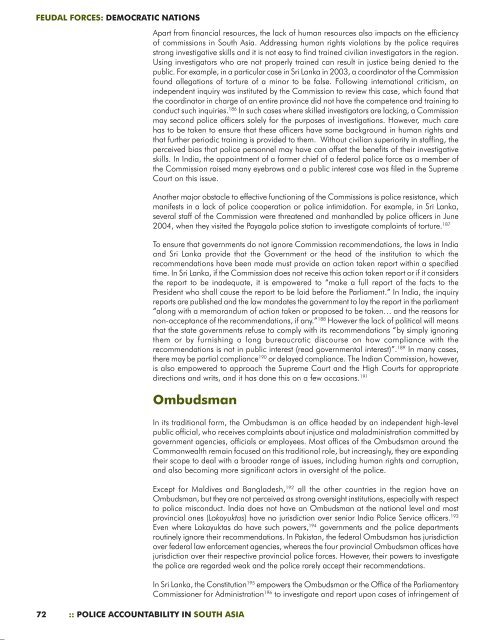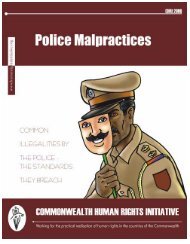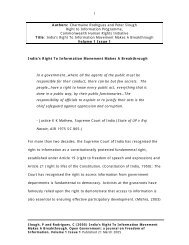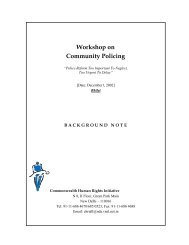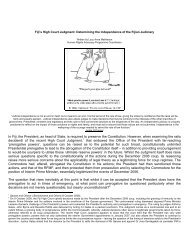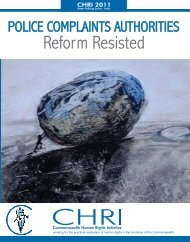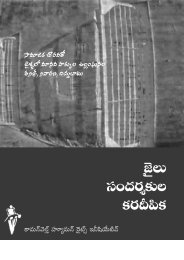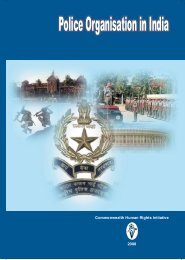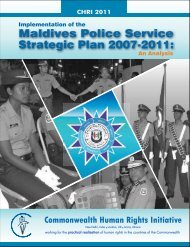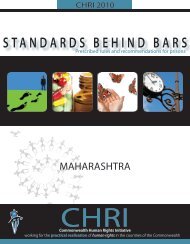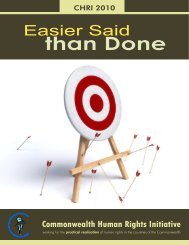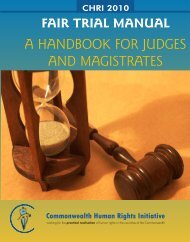Feudal Forces: Democratic Nations - Police Accountability in
Feudal Forces: Democratic Nations - Police Accountability in
Feudal Forces: Democratic Nations - Police Accountability in
You also want an ePaper? Increase the reach of your titles
YUMPU automatically turns print PDFs into web optimized ePapers that Google loves.
FEUDAL FORCES: DEMOCRATIC NATIONS72 :: POLICE ACCOUNTABILITY IN SOUTH ASIAApart from f<strong>in</strong>ancial resources, the lack of human resources also impacts on the efficiencyof commissions <strong>in</strong> South Asia. Address<strong>in</strong>g human rights violations by the police requiresstrong <strong>in</strong>vestigative skills and it is not easy to f<strong>in</strong>d tra<strong>in</strong>ed civilian <strong>in</strong>vestigators <strong>in</strong> the region.Us<strong>in</strong>g <strong>in</strong>vestigators who are not properly tra<strong>in</strong>ed can result <strong>in</strong> justice be<strong>in</strong>g denied to thepublic. For example, <strong>in</strong> a particular case <strong>in</strong> Sri Lanka <strong>in</strong> 2003, a coord<strong>in</strong>ator of the Commissionfound allegations of torture of a m<strong>in</strong>or to be false. Follow<strong>in</strong>g <strong>in</strong>ternational criticism, an<strong>in</strong>dependent <strong>in</strong>quiry was <strong>in</strong>stituted by the Commission to review this case, which found thatthe coord<strong>in</strong>ator <strong>in</strong> charge of an entire prov<strong>in</strong>ce did not have the competence and tra<strong>in</strong><strong>in</strong>g toconduct such <strong>in</strong>quiries. 186 In such cases where skilled <strong>in</strong>vestigators are lack<strong>in</strong>g, a Commissionmay second police officers solely for the purposes of <strong>in</strong>vestigations. However, much carehas to be taken to ensure that these officers have some background <strong>in</strong> human rights andthat further periodic tra<strong>in</strong><strong>in</strong>g is provided to them. Without civilian superiority <strong>in</strong> staff<strong>in</strong>g, theperceived bias that police personnel may have can offset the benefits of their <strong>in</strong>vestigativeskills. In India, the appo<strong>in</strong>tment of a former chief of a federal police force as a member ofthe Commission raised many eyebrows and a public <strong>in</strong>terest case was filed <strong>in</strong> the SupremeCourt on this issue.Another major obstacle to effective function<strong>in</strong>g of the Commissions is police resistance, whichmanifests <strong>in</strong> a lack of police cooperation or police <strong>in</strong>timidation. For example, <strong>in</strong> Sri Lanka,several staff of the Commission were threatened and manhandled by police officers <strong>in</strong> June2004, when they visited the Payagala police station to <strong>in</strong>vestigate compla<strong>in</strong>ts of torture. 187To ensure that governments do not ignore Commission recommendations, the laws <strong>in</strong> Indiaand Sri Lanka provide that the Government or the head of the <strong>in</strong>stitution to which therecommendations have been made must provide an action taken report with<strong>in</strong> a specifiedtime. In Sri Lanka, if the Commission does not receive this action taken report or if it considersthe report to be <strong>in</strong>adequate, it is empowered to “make a full report of the facts to thePresident who shall cause the report to be laid before the Parliament.” In India, the <strong>in</strong>quiryreports are published and the law mandates the government to lay the report <strong>in</strong> the parliament“along with a memorandum of action taken or proposed to be taken… and the reasons fornon-acceptance of the recommendations, if any.” 188 However the lack of political will meansthat the state governments refuse to comply with its recommendations “by simply ignor<strong>in</strong>gthem or by furnish<strong>in</strong>g a long bureaucratic discourse on how compliance with therecommendations is not <strong>in</strong> public <strong>in</strong>terest (read governmental <strong>in</strong>terest)”. 189 In many cases,there may be partial compliance 190 or delayed compliance. The Indian Commission, however,is also empowered to approach the Supreme Court and the High Courts for appropriatedirections and writs, and it has done this on a few occasions. 191OmbudsmanIn its traditional form, the Ombudsman is an office headed by an <strong>in</strong>dependent high-levelpublic official, who receives compla<strong>in</strong>ts about <strong>in</strong>justice and maladm<strong>in</strong>istration committed bygovernment agencies, officials or employees. Most offices of the Ombudsman around theCommonwealth rema<strong>in</strong> focused on this traditional role, but <strong>in</strong>creas<strong>in</strong>gly, they are expand<strong>in</strong>gtheir scope to deal with a broader range of issues, <strong>in</strong>clud<strong>in</strong>g human rights and corruption,and also becom<strong>in</strong>g more significant actors <strong>in</strong> oversight of the police.Except for Maldives and Bangladesh, 192 all the other countries <strong>in</strong> the region have anOmbudsman, but they are not perceived as strong oversight <strong>in</strong>stitutions, especially with respectto police misconduct. India does not have an Ombudsman at the national level and mostprov<strong>in</strong>cial ones (Lokayuktas) have no jurisdiction over senior India <strong>Police</strong> Service officers. 193Even where Lokayuktas do have such powers, 194 governments and the police departmentsrout<strong>in</strong>ely ignore their recommendations. In Pakistan, the federal Ombudsman has jurisdictionover federal law enforcement agencies, whereas the four prov<strong>in</strong>cial Ombudsman offices havejurisdiction over their respective prov<strong>in</strong>cial police forces. However, their powers to <strong>in</strong>vestigatethe police are regarded weak and the police rarely accept their recommendations.In Sri Lanka, the Constitution 195 empowers the Ombudsman or the Office of the ParliamentaryCommissioner for Adm<strong>in</strong>istration 196 to <strong>in</strong>vestigate and report upon cases of <strong>in</strong>fr<strong>in</strong>gement of


